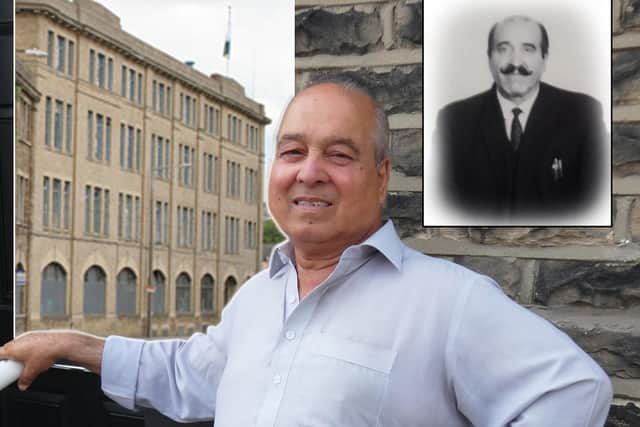Heckmondwike Stories In A Suitcase: Mahmood’s employment history after leaving school
and live on Freeview channel 276
He was part of a large group of Indian and Pakistani nationals who were encouraged to come and work in our local mills throughout the post-war decades of the 1960's and 1970's.
These men came to Britain because of a severe labour shortage existing during that period across the whole country.
Advertisement
Hide AdAdvertisement
Hide AdAs someone who now makes up a dwindling generation, Mr. Hussain has agreed to be interviewed for the Kirklees Faith Network's "Heckmondwike Stories In A Suitcase Project".


This week's final fourth feature on him is an account from Mr. Hussain of his employment history after leaving school.
Speaking to the Reporter Series, Mr. Hussain said: "The first job I had immediately after leaving school in 1969 was at Fox's Biscuits in Batley where I worked for a year.
“I had to stand near a conveyor belt for seven hours passing on a wide range of assorted biscuits to a group of older female employees whose task was to pack them into large boxes for distribution.
Advertisement
Hide AdAdvertisement
Hide Ad“It was a tiresome role especially for my hands and arms! Yet, the twelve months spent at 'Fox's showed I had the stamina to work under pressure.
"Despite getting some valuable frontline experience at Fox's Biscuits of what life was like in the big world of work, I decided to move on after a year.
“The new Seventies decade had begun - and 1970 was the year when I got my first job working inside an actual factory - which is something I had always wanted to do ever since I came to England at the age of 11.
“The factory's name was Wellington Mills located in Liversedge. This mill specialised in making carpets with yarn. My job was to work in a section of its 'shop-floor' where 'office carpets' were manufactured with protective felt stuck underneath them.
Advertisement
Hide AdAdvertisement
Hide Ad"The start time of my shift was 7.30am in the morning and the ‘clocking out’ time happened to be 4.30pm in the afternoon. An hour was given shortly after midday for lunch. My weekly wage was £9.
“I worked for a year from Monday to Friday making carpets at that Liversedge based mill until I eventually got a job even closer to home - at T.A Firth's in Heckmondwike town centre.
“The year was 1971 when I moved to 'Firth's'. The fact I was able to 'switch' three different jobs within a space of only two years shows just how easily work could be found in that era!
"I was employed at T.A. Firth's for nearly three years until 1974 when a new job was then offered to me at Crofts Mill. This factory was also located in Heckmondwike town centre - and it stood on the exact plot of land where the WM Morrisons Supermarket has now been built. 'Crofts' was another mill at that time making woollen carpets.
Advertisement
Hide AdAdvertisement
Hide Ad“I noticed a number of first-generation British-Indian Army veterans were also working there. The weekly wage rate at both 'Crofts' and 'Firth's was £10. I stayed at Crofts Mill for seven years until a manager from T.A. Firth's called Major Fred Bland came to my home one evening in 1981 - and to my surprise asked me to return back to 'Firth's'!
"Fred Bland was an interesting character who used to have an important role to play in the lives of many Pakistani migrants working at 'Firth's during those days. He was an ex-soldier who had done his army service in the Indian Sub-Continent throughout the 1930's. He had then spent most of his wartime years at the RAF Chaklala Airbase near Rawalpindi.
“As a former soldier, he obviously knew a great deal about the role our first-generation Pakistani men had played in the British-Indian Army. He was not surprisingly aware that a large number of these first-generation 'elders', including my own father Sephoy (Private) Lal Hussain, had fought in the Second World War.
"My father had already worked at T.A Firth until he passed away in 1974. Fred Bland had known him well.
Advertisement
Hide AdAdvertisement
Hide Ad"Because of our military heritage, Major Fred Bland had a natural fondness for us Pakistani migrants. He never discriminated against the Pakistani workforce.
“Instead, Major Bland would always go out of his way to encourage all the employees - white-English as well as the Pakistani workers to 'book in' overtime work whenever any was available. He was a lovely man who treated everyone equally.
"So the Major's visit to my house came as a rather unexpected surprise! It was a nice feeling to know my services at 'Firth's were remembered by someone like Fred Bland.
"I agreed to his request and returned back to T.A Firth's in the year 1981 - nearly seven years after I had left in 1974. My second work tenure at 'Firth's lasted four years until I decided to go back again to Crofts Mill in 1985.
Advertisement
Hide AdAdvertisement
Hide Ad"I continued working at Crofts Mill for only a year on this second occasion until 1986 when I decided to leave factory work permanently. I then made a decision many second-generation Pakistani men like me were beginning to make during that 1980's decade.
“The decision was to become a taxi-driver. I would work in the taxi trade for the next 32 years until my eventual retirement in 2018.”